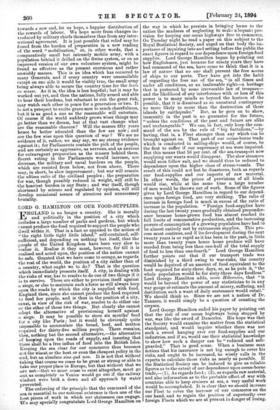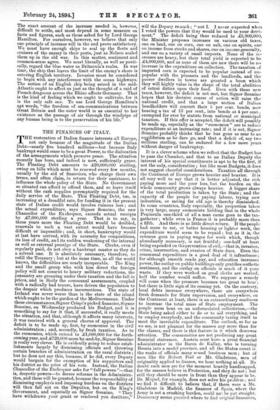LORD G. HAMILTON ON OUR FOOD-SUPPLIES.
'ENGLAND is no longer a country. She is morally and politically in the position of a city which includes a large number of parks and gardens, but which cannot produce the food required to support the people who dwell within it. That is a fact so opposed to the notion of "the right little tight little island," self-contained, self- sufficient, and depending on nothing but itself, that the ,people of the United. Kingdom have been very slow to realise it. Realise it they must, however, for till it is realised and acted upon, the position of the nation cannot be safe. Granted that we have come to occupy, as regards the rest of the world, the position of a city rather than of a country, what ought we to do ? That is the question which immediately presents itself. A city, in dealing with the risks of war, has to resolve to do one of two things if it is to survive. These are either to provision itself against a siege, or else to maintain such a force as will always keep -open the roads by which the city is supplied with food. England then, since she cannot produce the food required to feed her people. and is thus in the position of a city, ,gaust, in view of the risk of war, resolve to do either one or the other of these two things. But clearly she cannot adopt the alternative of provisioning herself against siege. It may be possible to store six months' food for a city like Paris ; but it would be obviously quite impossible to accumulate the bread, beef, and mutton required for thirty-five million people. There remains, then, nothing but the second alternative,—the alternative -of keeping open the roads of supply, and insuring that -there shall be a free influx of food into the British Isles. Keeping the sea clear for our commerce thus becomes mot the wisest or the best or even the cheapest policy in the .end, but an absolute sine qud non. It is not that without taking that course we cease to be great or strong or able to take our proper place in Europe, but that without that we are not—that we must cease to exist altogether, must go out as completely as Venice would go out if the railway viaduct were brok n down and all approach by water prevented. The enforcing of the principle that the command of the sea is essential to our national existence is then one of the best pieces of work in which our statesmen can engage. 'We may specially congratulate lord George Hamilton on the way in which he persists in bringing home to the nation the madness of neglecting to make a lequate pro- vision for keeping our ocean highways free to commerce. On Tuesday night he read a paper on this subject to the Royal Statistical Society, and urged on that body the im- portance of inquiring into and setting before the public the exact figures in regard to our dependence upon foreign food supplies. Lord George Hamilton began by pointing out how Englishmen, just because for ninety years they have had command of the sea, have come to think that it is a law of nature that no one shall prevent the free access of ships to our ports. They have got into the habit of regarding the free use of the sea, " in all times and under all conditions, as an inalienable right—a heritage that is protected by some irrevocable law of trespass— and the likelihood of any interference with or loss of this power is to many minds so beyond the horizon of the possible, that it is dismissed as an unnatural contingency no more likely to occur than the destruction of these islands by earthquake." But, as he goes on to show, immunity in the past is no guarantee for the future, "unless the conditions of the past and future are alike and unchangeable." We can, in fact, only keep the- com- mand of the sea by the rule of " big battalions,"—by having, that is, a Fleet stronger than any which can be brought against us. That part of our ocean-borne trade which is conducted in sailing-ships would, of course, be the first to suffer if our supremacy at sea were impaired. But this means that 16 per cent. of the sea-transport now supplying our wants would disappear. The slow steamers would soon follow suit, and we should thus be reduced to dependence upon the higher class of steam-vessels. The result of this could not but be disastrous, both as regards our food-supplies and our imports of raw material. In other words, the prices of provisions of all kinds would rise, while at the same time a large number of men would be thrown out of work. Some of the figures given by Lord George Hamilton in regard to our depend- ence upon foreign food, are very striking. The ratio of increase in foreign food is much in excess of the ratio of increase in the population. " Foreign food-supplies have during the last twenty years gradually obtained preponder- ance because home-grown food has almost reached its full limits of remunerative production, and the increasing powers of consumption of a growing population have had to be almost entirely met by extraneous supplies. This pro- cess must continue, and if its development during the next twenty years is as rapid as it has been in the past, in little more than twenty years hence home produce will have receded from being less than one-half of the total supply of food to less than one-fourth." Lord George Hamilton further points out that if our transport trade was diminished by a third owing to war-risks, the country would be deprived of an amount of food equivalent to the food required for sixty-three days, or, as he puts it, " the whole population would be for sixty-three days foodless." Lord George Hamilton adds, more Hibernico, that " it would be beyond the power of any statistician to in any way gauge or estimate the amount of misery, suffering, and destitution such a want of daily sustenance would entail." We should think so. Since we are not a nation of Dr. Tanners, it would simply be a question of counting the corpses. Lord George Hamilton ended his paper by pointing out that the risk of our ocean highways being stopped by war, was like the sword of Damocles. His hope was that the Society would examine the matter from the statistical standpoint, and would inquire whether there was not such a sword hanging over our food-supplies and our industries, and if so, would use their statistical knowledge to show how such a danger can be " reduced and safe- guarded." That is good sense. When a business man notices that his insurance is not big enough to cover his risks, and ought to be increased, he wisely calls in the experts to calculate those risks as nearly as possible. If the Statistical Society can be induced to give us reliable figures as to the extent of our dependence upon ocean-borne trade,—(1), As regards food ; (2). as regards raw material, and also information as to the probable effect of war with countries able to keep cruisers at sea, a very useful work would be accomplished. It is clear that we should increase our Fleet to cover the increase of our commerce on the one hand, and to regain the position of superiority over foreign Fleets which we are at present in danger of losing. The exact amount of the increase needed is, however, difficult to settle, and must depend in some measure on facts and figures, such as those asked for by Lord George Hamilton. For ourselves, however, we believe that only one principle of increase will in the end prove satisfactory. We must have enough ships to seal up the fleets and cruisers of the enemy in their ports, just as Nelson sealed them up in the old war. In this matter, sentiment and common-sense agree. We must literally, as well as poeti- cally, regard the blue water as Britannia's realm. In war time, the ship that leaves the limit of the enemy's shore is entering English territory. Invasion must be considered to begin with any interference with the ocean highways. The notion of an English ship being seized in the mid- Atlantic ought to affect us just as the thought of a raid of French dragoons across the Rhine affects Germany. That is the kind of feeling which we ought to cultivate, for it is the only safe one. To use Lord George Hamilton's apt words, "the freedom of sea-communications between Great Britain and the outer world is as essential to her existence as the passage of air through the windpipe of any human being is to the preservation of his life."



































 Previous page
Previous page